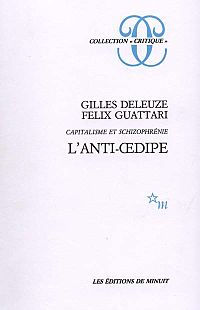
Back معاداة أوديب Arabic Анти-Едип Bulgarian Anti-Ødipus Danish El Anti Edipo Spanish ضد ادیپ Persian Anti-Oidipus Finnish L'Anti-Œdipe French Հակա-Էդիպուս Armenian L'Anti-Edipo Italian アンチ・オイディプス Japanese
 Cover of the first edition | |
| Authors | Gilles Deleuze Félix Guattari |
|---|---|
| Original title | Capitalisme et schizophrénie L'anti-Œdipe |
| Translators | Robert Hurley Mark Seem Helen R. Lane |
| Language | French |
| Subject | Capitalism, schizoanalysis |
| Publisher | Les Éditions de Minuit, Viking Penguin |
Publication date | 1972 |
| Publication place | France |
Published in English | 1977 |
| Media type | Print (Hardcover and Paperback) |
| Pages | 494 (French edition) 400 (University of Minnesota Press edition) |
| ISBN | 0-8166-1225-0 (University of Minnesota Press edition) |
| Followed by | A Thousand Plateaus (1980) |
Anti-Oedipus: Capitalism and Schizophrenia (French: Capitalisme et schizophrénie. L'anti-Œdipe) is a 1972 book by French authors Gilles Deleuze and Félix Guattari, the former a philosopher and the latter a psychoanalyst. It is the first volume of their collaborative work Capitalism and Schizophrenia, the second being A Thousand Plateaus (1980).
In the book, Deleuze and Guattari developed the concepts and theories in schizoanalysis, a loose critical practice initiated from the standpoint of schizophrenia and psychosis as well as from the social progress that capitalism has spurred. They refer to psychoanalysis, economics, the creative arts, literature, anthropology and history in engagement with these concepts.[1] Contrary to contemporary French uses of the ideas of Sigmund Freud, they outlined a "materialist psychiatry" modeled on the unconscious regarded as an aggregate of productive processes of desire, incorporating their concept of desiring-production which interrelates desiring-machines and bodies without organs, and repurpose Karl Marx's historical materialism to detail their different organizations of social production, "recording surfaces", coding, territorialization and the act of "inscription". Friedrich Nietzsche's ideas of the will to power and eternal recurrence also have roles in how Deleuze and Guattari describe schizophrenia; the book extends from much of Deleuze's prior thinking in Difference and Repetition and The Logic of Sense that utilized Nietzsche's ideas to explore a radical conception of becoming.
Deleuze and Guattari also draw on and criticize the philosophies and theories of: Spinoza, Kant, Charles Fourier, Charles Sanders Peirce, Carl Jung, Melanie Klein, Karl Jaspers, Lewis Mumford, Karl August Wittfogel, Wilhelm Reich, Georges Bataille, Louis Hjelmslev, Jacques Lacan, Gregory Bateson, Pierre Klossowski, Claude Lévi-Strauss, Jacques Monod, Louis Althusser, Victor Turner, Jean Oury, Jean-François Lyotard, Michel Foucault, Frantz Fanon, R. D. Laing, David Cooper, and Pierre Clastres.[2]
They additionally draw on authors and artists whose works demonstrate their concept of schizophrenia as "the universe of productive and reproductive desiring-machines",[3] such as Antonin Artaud, Samuel Beckett, Georg Büchner, Samuel Butler, D. H. Lawrence, Henry Miller, Marcel Proust, Arthur Rimbaud, Daniel Paul Schreber, Adolf Wölfli, Vaslav Nijinsky, Gérard de Nerval and J. M. W. Turner.[2]
Thus, given the richness and diversity of the source material it draws upon and the grand task it sets out to accomplish, Anti-Oedipus can, as Michel Foucault suggests in the preface to the text, "best be read as an 'art,'" and it would be a "mistake to read [it] as the new theoretical reference" in philosophy.[4]
Anti-Oedipus became a sensation upon publication and was widely celebrated, creating shifts in contemporary philosophy. It is seen as a key text in the "micropolitics of desire", alongside Lyotard's Libidinal Economy. It has been credited with devastating Lacanianism due to its unorthodox criticism of the movement.